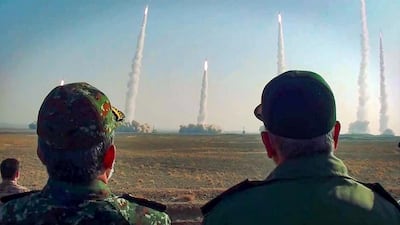Iran's paramilitary Revolutionary Guard forces on Friday held a military exercise involving ballistic missiles and drones in the country's central desert, state TV reported, amid heightened tension over Tehran's nuclear programme and a US pressure campaign against Iran.
The drill was the latest show of force by Iran in recent weeks before the January 20 inauguration of Joe Biden as US president following four years of escalating tension with Washington under the administration of President Donald Trump.
In the first phase of the drill on Friday morning, the Guard’s aerospace division launched several surface-to-surface ballistic missiles against simulated enemy bases, state TV reported. It said the drill included Zolfaghar and Dezful solid-fuel ballistic missiles.
Bomb-carrying drones were also deployed. The Dezful, a version of the Zolfaghar, has a 700-kilometre range and 450-kilogram warhead.
Iranian media carried footage of the exercise showing simultaneous missile launches and drones dive-bombing a target. The exercises were observed by the Revolutionary Guard's top commander, Hossein Salami, and the chief of its aerospace division, Amir Ali Hajizadeh, Tasnim news agency reported.
Iran has missile capability of up to 2,000km, far enough to reach Israel and US military bases in the region. Last January, after the US killed a top Iranian general in Baghdad, Tehran retaliated by firing a barrage of ballistic missiles at two Iraqi bases housing US troops, resulting in brain concussion injuries in dozens of soldiers.
On Wednesday, the Iranian navy held a two-day short-range missile drill in the Gulf of Oman. Last Saturday, the Revolutionary Guard held a naval parade in the Arabian Gulf. A week earlier, Iran held a drone manoeuvre across half the country.
Tension is again rising in the waning days of the Trump administration, as Tehran ramps up pressure on the West over the US sanctions campaign.
Mr Trump in 2018 withdrew the US from the nuclear deal with Iran, in which Tehran had agreed to limit its uranium enrichment in exchange for the lifting of economic sanctions. The US president cited Iran’s ballistic missile programme and its regional interference among other issues for withdrawing from the accord.
When the US then increased sanctions, Iran gradually and publicly abandoned the deal's limits on its nuclear development. Tehran has announced the start of uranium enrichment to 20 per cent, considered a short technical step from producing weapons-grade nuclear material, and is threatening to bar inspectors from the UN's atomic watchdog.

